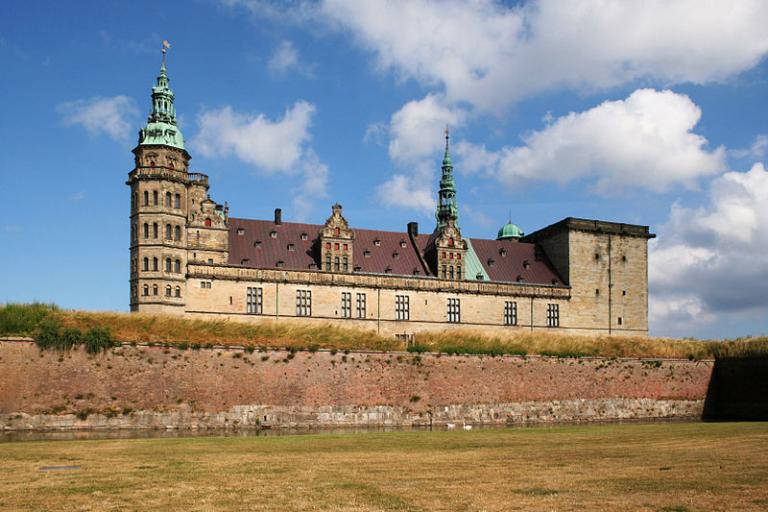
In my immediately previous post on Hamlet, I began to discuss the late Eugene England’s suggestion that the ghost who appears on the ramparts of the castle of Elsinore and who urges Prince Hamlet on to revenge might well have been a satanic counterfeit. The ghost might have intended Hamlet’s ruin and that of Denmark and its royal family altogether. Read this way, Hamlet is a dramatic illustration of the evils engendered by the spirit of revenge.
I don’t recall the specifics of Gene’s argument off hand, but here are some passages that might lend it weight (along with the obvious fact that following the ghost’s counsel did in fact lead to the destruction of the Danish royal family, the conquest of Denmark by Norway, and the death of Hamlet himself).
When the ghost first appears to Hamlet, the prince addresses it in terms that expressly allow the possibility that it might be demonic:
Be thou a spirit of health or goblin damn’d,
Bring with thee airs from heaven or blasts from hell,
Be thy intents wicked or charitable,
Thou com’st in such a questionable shape
That I will speak to thee. (1.4.669-673)
And his friend Horatio’s warning against following the ghost — against literally following it but perhaps also against doing so metaphorically — is not only prudent but, in a sense, prophetic:
What if it tempt you toward the flood, my lord,
Or to the dreadful summit of the cliff
That beetles o’er his base into the sea,
And there assume some other, horrible form
Which might deprive your sovereignty of reason
And draw you into madness? (1.4.702-707)
The ghost explicitly identifies itself as a denizen of Hell, where it dwells amidst “sulph’rous and tormenting flames” (1.5.737).
“I am thy father’s spirit,” it says (although the truth of its claim is impossible to verify and perhaps utterly false),
Doom’d for a certain term to walk the night,
And for the day confin’d to fast in fires,
Till the foul crimes done in my days of nature
Are burnt and purg’d away. But that I am forbid
To tell the secrets of my prison house,
I could a tale unfold whose lightest word
Would harrow up thy soul, freeze thy young blood,
Make thy two eyes, like stars, start from their spheres,
Thy knotted and combined locks to part,
And each particular hair to stand on end
Like quills upon the fretful porcupine.
But this eternal blazon must not be
To ears of flesh and blood. (1.5.745-758)
Considerably later in the play, when Hamlet conceives the plan of confirming or disconfirming Claudius’s responsibility for the death of the late king by means of a small play within the play, he is still aware of the fact that the ghost whose demand for vengeance has been guiding his course since the beginning of the story may indeed be an evil deceiver:
The spirit that I have seen
May be the devil: and the devil hath power
To assume a pleasing shape; yea, and perhaps,
Out of my weakness and my melancholy,
As he is very potent with such spirits,
Abuses me to damn me. I’ll have grounds
More relative than this. The play’s the thing
Wherein I’ll catch the conscience of the King. (2.2.627-634)
Hamlet is confident that, if Claudius does turn out to have murdered his father, the ghost will be proven not to be diabolical. But his confidence is misplaced. As the audience knows and as Hamlet will soon verify, Claudius is indeed guilty of fratricidal murder. But that by no means demonstrates that the ghost is benevolent or good. Might the ghost not be baiting its hook with enough truth to catch the prince and destroy him?
If Hamlet had enjoyed the privilege of reading Shakespeare’s tragic play Macbeth, he would have encountered the warning given by Banquo to his friend Macbeth after their enounter with the three prophetic “weird sisters” out on the heath:
The instruments of darkness tell us truths,
Win us with honest trifles, to betray ’s
In deepest consequence. (Macbeth 1.3.135-138)
And he would have seen, in that story, how their prophecy of Macbeth’s rise to the rule of Scotland led to Macbeth’s assassination of a virtuous king and the murder of his faithful servants, Macbeth’s treacherous murder of Banquo, Macbeth’s extermination of Macduff’s innocent wife and children, the insanity and likely suicide of Lady Macbeth (who bears an equal share of guilt for the whole affair), and, ultimately, the death of Macbeth himself. Yes, he was briefly king of Scotland. In the end, though, his ambition, urged on by plainly demonic forces, destroyed him, many others, and everything he cared for.










